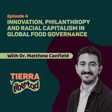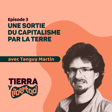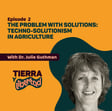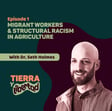
Episode 5: Agriculture industrielle : comprendre ses racines, imaginer l’après
Dans cette épisode, je reçois Jacques Caplat. En tant qu’agronome, il a travaillé dans de nombreux rôle, en tant que conseiller agricole, puis dans plusieurs organisations liée au développement de l’agriculture biologique et des semence paysanne. Jacques est aussi conférencier et écrivain. Il est l’auteur de plusieurs ouvrages, dont Une agriculture qui répare la planète, coécrit avec l’écoféministe indienne Vandana Shiva. Dans son dernier ouvrage intitulé Agriculture industrielle, il décrypte les origines et conséquences de ce modèle agricole que l'on considère maintenant comme conventionnel, et met en lumière des alternatives.
📝 Notes de l’épisode:
Agriculture industrielle et Une agriculture qui répare la planète, de Jacques Caplat
Et le monde devint silencieux, de Stéphane Foucart
Le printemps silencieux, de Rachel Carson
Silence dans les champs, de Nicolas Legendre
Champs de Bataille, l'histoire enfouie du remembrement, de Inès Léraud avec Léandre Mandard et Pierre Van Hove
Paysannes. Histoire de la cause des femmes dans le monde agricole, de Jean-Philippe Martin
Les moissons du futur, de Marie-Monique Robin
Il est où le patron?, réalisée par Maud Bénézit et le collectif Les paysannes en polaire
FNAB, la Fédération Nationale d’Agriculture Biologique,
👋 Restons en contact!
https://tierraylibertadpodcast.org/
Instagram: https://www.instagram.com/tierraylibertad_podcast/
✊Soutenez-nous: https://fr.tipeee.com/tierra-y-libertad-podcast



